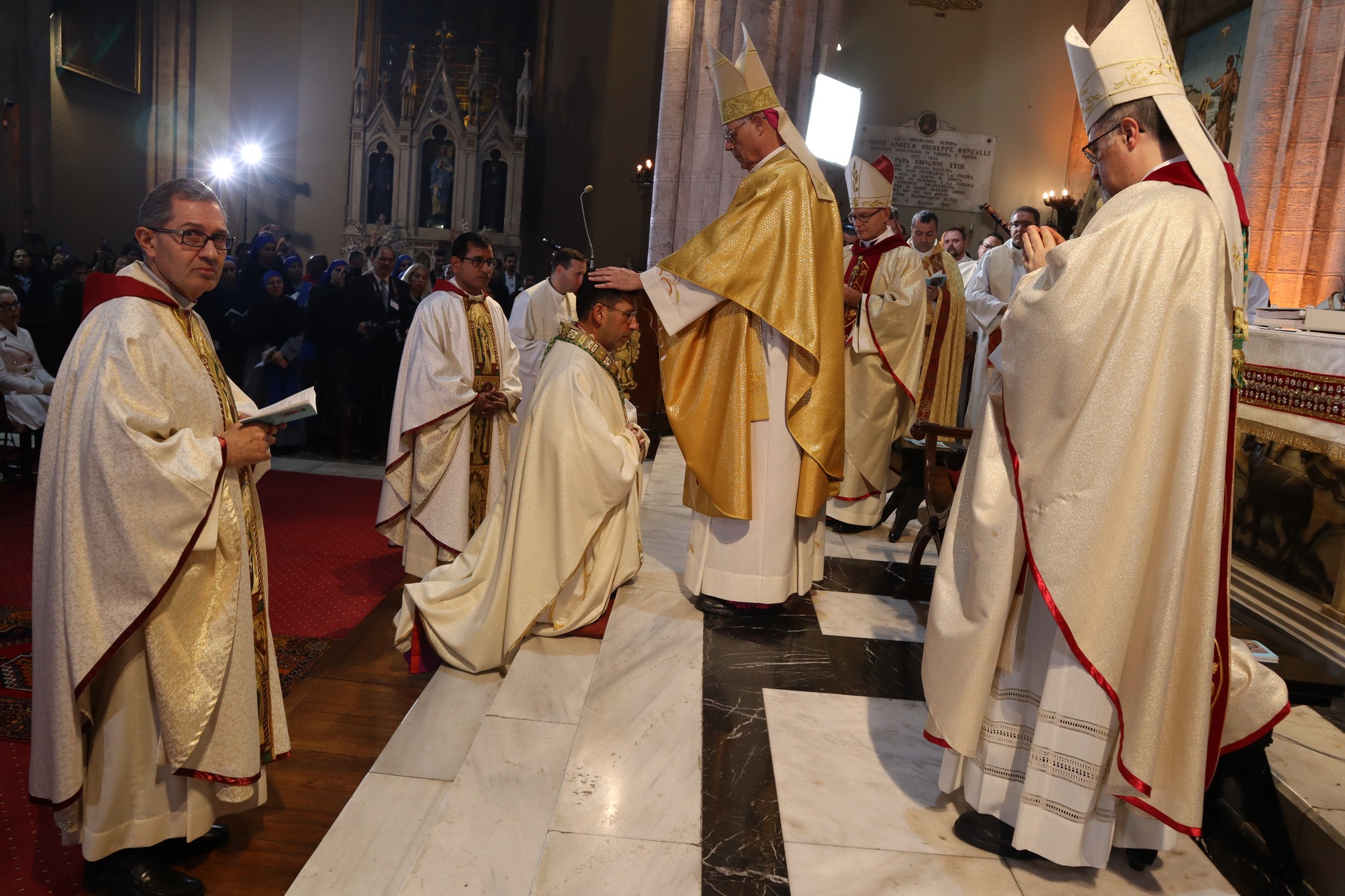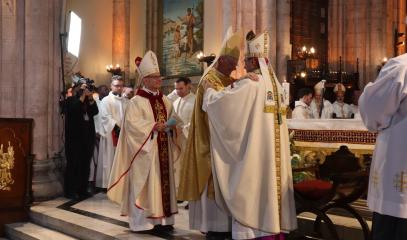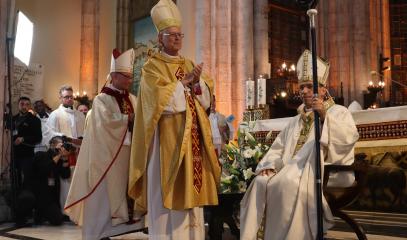Bishop Bizzeti: a ‘Turkish Church’ fulfilment of mission in Vicariate of Anatolia
Yesterday the Pontiff accepted the prelate's request for resignation, appointing auxiliary Msgr Ilgit as apostolic administrator. Satisfaction for the growth of a reality ‘of Turkish language and culture’. The earthquake of February 2023 still an open wound, need to rebuild from ‘living stones’. The testimony of refugees and displaced persons who broaden horizons on a ‘cultural, spiritual’ level.
Milan (AsiaNews) - ‘From the moment I took office I said that I would have favoured in every way the birth of a local Church, of Turkish language and culture’ and over time ‘I have remained faithful to this principle’ in the wake traced by the Second Vatican Council, sumarizes Msgr . Paolo Bizzeti, long-time vicar of Anatolia whose resignation was accepted by Pope Francis yesterday. Auxiliary Msgr. Antuan Ilgit, has been appointed now apostolic administrator sede vacante et ad nutum Sanctae Sedis.
In promoting the mission, the prelate has always considered ‘the formation of the laity a very important point’, along with ‘welcoming those who come in search of Christianity’ by showing themselves capable of bearing witness to the ‘reasons for their hope, as Saint Peter would say’. And he adds: ‘a conscious Church is fundamental, one that renounces proselytism but is alive in society, with a proposal of meaning, spirituality and salvation’.
The 77-year-old Jesuit of Italian origin had been at the head of the ecclesiastical district since 2015, taking over at a time of profound criticality and confessional tensions due to the murder, in June 2010 in Iskenderun, of his predecessor Msgr Luigi Padovese, who was stabbed by the MuratAltun driver. Msgr. Bizzeti remains in the service of the church in Turkey as president of Caritas, thus still maintaining a strong link with the land where he spent nine years of his mission. However, he says, ‘I really believe that these Churches must have pastors who speak their language and know their culture; we foreigners have been filling in, but the future is in the hands of the Christians of Turkey’.
Earthquake, open wound
Recounting the reality of the vicariate, Bishop Bizzeti explains that for months his successor Bishop Ilgit has been working alongside him in the management of the community, whose main emergency is still linked to the devastating earthquake of February 2023 and the ‘aftermath’ of the earthquake, a wound that is still open. ‘The cathedral is still destroyed,’ he explains, “people are struggling to find housing or work,” and within this framework there are “the most critical situations, which are flanked by ordinary pastoral work,” although the presence of a Turkish bishop ’will allow a qualitative leap. Now, finally, the story of a truly local Church begins, with a pastor of its own language and culture'. Among the positive elements linked to the natural disaster, the prelate emphasises ‘the solidarity that has been created among people; we saw it at the time of the earthquake when everyone lent a hand, got involved, many barriers fell, it was discovered that we were all affected by the same drama and all eager to do something: that was a truly remarkable moment’.
The priority is to restore ‘a real life, houses and economic activities to the earthquake victims, but also to be able to keep the Christians who would otherwise flee: they are already,’ emphasises Mgr Bizzeti, ‘very small communities, we must try to help people to stay, otherwise there will be an emptying of presence. The number one challenge is the ‘living stones’ then there is the cathedral, but the walls will come later'. In the meantime, he continues, the local Church ‘has grown in self-awareness, in the importance of the role of the laity, for which I have fought and also made specific training initiatives. Today the laity in Turkey,' he says, “are beginning to be aware that the Church of the future must be built together, it cannot be left to foreigners or only to pastors”. And in this perspective, the handover with Msgr. Ilgit, which has already taken place in practice in recent months, is ‘in a perspective of continuity, although I do not want to condition the legacy. However, I think that many things will continue along the lines begun'.
Bishop Padovese's legacy and Islam
Looking back over his years as vicar, the prelate cannot help but start from the heavy legacy - and the void - left by the brutal murder of Bishop Padovese: ‘The situation,’ he recalls, ‘was disastrous, because almost six years without a bishop had deprived them of resources, of coordination: the faithful were still in shock, not only at his death, but also at the fact that nothing was done to give continuity to the previous work. So the main task was first of all to boost people's morale, and to help them still believe that it was not a forgotten Church'.
On the subject of ecumenism and interreligious dialogue, he continued, ‘in recent years, the Bishops’ Conference has worked very well: we have cordial relations with all the other Churches, in particular the Syriac Church, for which I have worked hard to enhance its artistic heritage, churches and monasteries also through the publication of a guide. These have been good steps and there is mutual esteem, even though they are all very small realities that need to be consolidated and tied to different legal situations'.
As for the Islamic-Christian dialogue - in a nation with a large Muslim majority, where faith also influences predominant sectors of politics - he says he has found ‘many people with a strong spirituality, a healthy and clean vision of life’. There is the ‘problem of a political Islam that perhaps does not distinguish sufficiently between the religious and political spheres,’ he emphasises, ‘but this is a problem that concerns the entire Middle East. Nevertheless, ‘decisive steps forward have been taken, we are not in the years of the killings of Bishop Padovese, of Father Andrea Santoro.
The memory of them is still alive, but there is no sterile nostalgia, because the very life of the Church has continued and others have taken their place'. There remains, finally, a broader problem that concerns the entire region, which is going through a ‘very complicated’ phase dictated also by ‘excessive interference by Western powers, in particular the United States’.
However, he adds, at this very moment in history Ankara ‘is distinguishing itself for a more balanced (political) proposal in dealing with conflicts, especially between the Israeli government and the Palestinians: I very much appreciate that there is someone who has the courage to denounce, like Pope Francis, that a genocide is taking place and this is being said in Turkey by so many people, as well as by President [Recep Tayyip] Erdogan’.
Young people, refugees
‘These years as vicar,’ he emphasises, ‘have been a formidable experience, because they have allowed me to broaden my horizons culturally, spiritually, in meeting other Christian worlds and other realities. It would be really interesting if every pastor had the opportunity to live far away, a few years, in lands different from his own’. In this perspective, the prelate frames ‘the many encounters with refugees from Afghanistan, Iran, Iraq and Syria’ who surprised him ‘with their resilience, their will to fight, their attempt to preserve traditions, to implement their faith’.
With the refugees it was also possible to discover a new dimension in the ‘value of encounter’, because they are people ‘who are bearers of an inner, human wealth, but also of work commitment, of culture, who flee precisely because they do not want to surrender to the logic of war, of indifference. They do not mind their own business to the detriment of others, but have so much to give. I am astonished,' he confesses, “when they are seen as a burden while they are a resource”, all the more so for nations, especially in the West, that are having fewer and fewer children and a population that is “ageing and closing in on itself”.
‘I believe that the neophytes, the young, the refugees are the great resources of a Church that wants to fully embrace the present and look to the future,’ emphasises Msgr Bizzeti.
‘Hence my wish for Msgr. Antuan so that with his abilities he can implement what I have just begun. I have known him for many years,’ he recalls, ever since ’he came to me in search of his vocation. I accompanied him in this search at an early stage, then he set out on his path, devoted himself to studies and ministry with tenacity, a pastor who sincerely wishes to serve the Church and the people'.
GATEWAY TO THE EAST IS THE ASIANEWS NEWSLETTER DEDICATED TO THE MIDDLE EAST. WOULD YOU LIKE TO RECEIVE IT EVERY TUESDAY? TO SUBSCRIBE, CLICK HERE.










.png)










